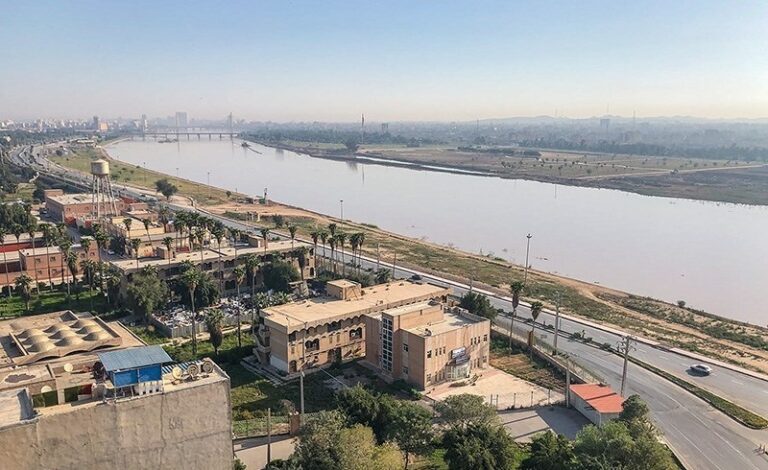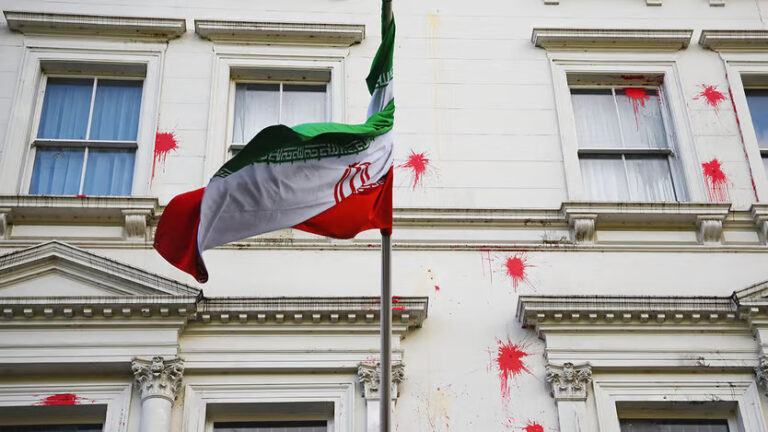By Muqbil al-Saeri
Manama, Asharq Al-Awsat – Bahraini Speaker of the Council of Representatives Khalifa Ahmed 
al-Zahrani spoke to Asharq Al-Awsat about the situation in the country, stressing that the situation is moving in a reassuring direction, and that he is confident that Bahrain will emerge safely from the crisis. Al-Zahrani confirmed that the Bahraini parliament’s operations have not been hindered or disrupted by the withdrawal of the Shiite Wefaq bloc [Islamic National Accord Association], which saw 18 MPs of Bahrain’s 40-member council withdrawing from Bahrain’s lower parliament. He also stressed that the Bahraini parliament is continuing to search for ways to resolve the situation in the country, calling for national dialogue. The Bahrain parliamentary speaker also categorically rejected any foreign intervention in Bahraini internal affairs, stressing that the deployment of the GCC Peninsula Shield Force was both legitimate and legal, according to the GCC Joint Defense Agreement.
The following is the full text of the interview:
[Asharq Al-Awsat] What is your assessment of the current situation in Bahrain?
[Al-Zahrani] The situation in Bahrain is moving in a reassuring direction after national safety was assured in a legal manner. We are confident that the Bahraini people and its wise leadership are capable of addressing the situation and reaching a state of safety. We also trust in the rational proposals made by the Bahraini leadership, and support these, particularly with regards to the importance of establishing security [in the country]. The Bahraini Council of Representatives has announces its commitment to national unity, as well as its commitment to national principles, the ruling regime in the Kingdom of Bahrain, the National Action Charter of Bahrain and the Bahraini constitution, and the process of ongoing reform which is based upon the reform project of the King, as well as the achievement of the legitimate demands made by the people in a consensual and legal manner.
[Asharq Al-Awsat] What role will the Bahraini parliament play in reaching a comprehensive resolution to the ongoing crisis in the country?
[Al-Zahrani] The parliament is part of the State; it is the legislative and constitutional institution that first issued calls for dialogue to help Bahrain emerge from the current situation. The Bahraini leadership has continued to underline that development and the achievement of popular demands will only occur via parliament, and this is in order to bring together the disparate viewpoints. The Bahraini parliament has worked to communicate with the leadership in order to achieve this, using all of the parliamentary and constitutional tools in its command. The Bahraini parliament is continuing to work, using national dialogue, rationality, as well as all of its constitutional tools, and cultural and legal methods, to address all the challenges that the country is facing.
[Asharq Al-Awsat] In your opinion, has the Bahraini parliament been weakened by the Shiite Wefaq [Islamic National Accord Association] bloc’s walkout?
[Al-Zahrani] The Wefaq bloc is an integral part of the Bahraini parliament, and we want to see the Wefaq bloc continue its parliamentary work, and that is why we have postponed the decision regarding the bloc’s resignation for two months. The Bahraini parliamentary members have invited them to continue to participate in the legislative branch and contribute to the parliamentary work by advancing the democratic process and supporting the rule of law to build a state based upon institutes, as part of the national project put in place by Bahraini King Hamad Bin Isa al-Khalifa.
As for martial law, martial law has not been declared in Bahrain; rather what has been announced is a state of “national safety” according to the Bahraini constitution. We are a state that is based upon laws and institutes, and this state of “national safety” has been announced according to Article 36 of the constitution, which states in part that “in all cases the period of marital law or national safety shall not exceed three months. This period may be renewed in whole or part once or more, provided that approval by a majority vote of the members constituting the National Assembly has been obtained.”
[Asharq Al-Awsat] Has the Wefaq bloc’s walkout disrupted the operation of Bahrain’s parliament or is it continuing to exercise its full powers?
[Al-Zahrani] The Bahraini Council of Representatives continues to exercise all of its powers under the provisions of the constitution and the law; all parliamentary committees continue to hold their weekly meetings, and the parliament continues to hold its [weekly] parliamentary sessions without any disruption, during which it reviews and discusses all the proposals and laws on its agenda. The weekly parliamentary session takes place ever Tuesday, and on the agenda next week is the general state budget for 2011 and 2012. This is one of the most important projects being discussed by the Council of Representatives in this current period.
[Asharq Al-Awsat] As the Bahraini parliament represents the voice of the people, can you tell us what action the parliament is planning to take in the near future with regards to the ongoing situation in the country?
[Al-Zahrani] The Council of Representatives has continually discussed the situation that the country has been experiencing since the beginning [of the crisis], and we held a meeting with the Bahraini Interior Minister to discuss the latest developments, whilst Bahrain’s Minister of Education also appeared before parliament to discuss the latest developments with the MPs during a parliament session. MPs are also scheduled to discuss the latest developments with the Bahraini Interior Minister during next Tuesday’s parliamentary session. There is ongoing communication with the Bahraini leadership and the responsible national authorities, and here we must point out that real power lies in self-restraint and building on the reform project launched by King Hamad, may God protect him.
[Asharq Al-Awsat] Are there solutions on the table to resolve the crisis?
[Al-Zahrani] Of course, [there is] Crown Prince Salman Bin Hamad al Khalifa’s response, calling all parties to participate in a 7-point dialogue, and we have complete confidence in his ability to resolve the crisis and achieve national cooperation for the sake of Bahrain and its future. The 7 points that the Crown Prince called be discussed are; parliamentary powers, constituencies’ fairness, citizenship, combating financial and administrative corruption, state property, and addressing sectarian tensions, as well as other principles and themes of national dialogue. The Crown Prince stressed the importance of an immediate response from all those who want peace, security, and reform to his call for dialogue, in order to achieve a prosperous and bright future for all the people of Bahrain. He also said that there was no objection to any agreements achieved in this dialogue being put to the public opinion by a special referendum.
[Asharq Al-Awsat] Have there been any attempts to convince the Wefaq bloc to return?
[Al-Zahrani] There is an open honest and sincere national call for participation in our legislative operations, and contribution with the Council of Representatives in advancing the democratic process and supporting the rule of law to build a state based upon institutions as part of the comprehensive national project. Bahrain is for everybody, and it will be built with the help of its entire people, and the Wefaq bloc is an important part of the Bahraini parliament.
[Asharq Al-Awsat] What is your opinion regarding the adverse response given by Iran and other states regarding what is happening in Bahrain? How will Bahrain deal with this?
[Al-Zahrani] We categorically reject any foreign intervention in Bahrain’s internal affairs from any [foreign] party or state, and we confirm that the presence of the Gulf Cooperation Council [GCC] Peninsula Shield Force is present in Bahrain legitimately and legally. We, in the Bahraini parliament, have welcomed the GCC Peninsula Shield Force to protect the safety, security, and stability of the Kingdom of Bahrain, according to the GCC Joint Defense Agreement.
[Asharq Al-Awsat] Does the Bahraini parliament support all the measures taken by the government to preserve security in the country?
[Al-Zahrani] Yes, we support all the measures taken by the government to preserve the security, safety, and stability of Bahrain, and ensure that the situation is not left open to those who want to harm the interests of others and the future of the country. We would also like to express our thanks to the GCC member-states, and the position of our neighboring and friendly countries, for their honest stance towards Bahrain. We would also like to confirm the leading role played by Custodian of the Two Holy Mosques King Abdullah Bin Abdulaziz particularly, as well as the positions of all heads of states and people who stood up and showed their solidarity with Bahrain.
[Asharq Al-Awsat] Are there any fears of the consequences of this crisis on Bahrain’s future, and on the unity of the country?
[Al-Zahrani] Every crisis has its consequences, and these could include economic, social, and political consequences. Some consequences are felt immediately, whilst others are revealed over time. These [fears] will not be in anybody’s interests, but we are confident that the wisdom of the Bahraini leadership and the steadfastness and faithfulness of the people of Bahrain will allow us to overcome any crisis. We stress the importance of listening to the voice of reason and acknowledging the legitimacy of the Al Khalifa ruling regime, led by King Hamad Bin Isa al Khalifa. We also stress the importance of listening to the nature of the Bahraini people of both [the Sunni and Shiite] communities, and the importance of strengthening this country that is based upon coexistence and tolerance, which is something that Bahrain has always been known for. We ask God Almighty to protect the Kingdom of Bahrain and its people from all evils, and to bless the country with security and stability under its wise leadership and its inherent and unwavering affiliation to the Arab Gulf, in order to complete the journey for the future generations.
A talk with Bahrain’s Parliamentary Speaker, Khalifa Ahmed al-Zahrani
You must be logged in to post a comment.











+ There are no comments
Add yours